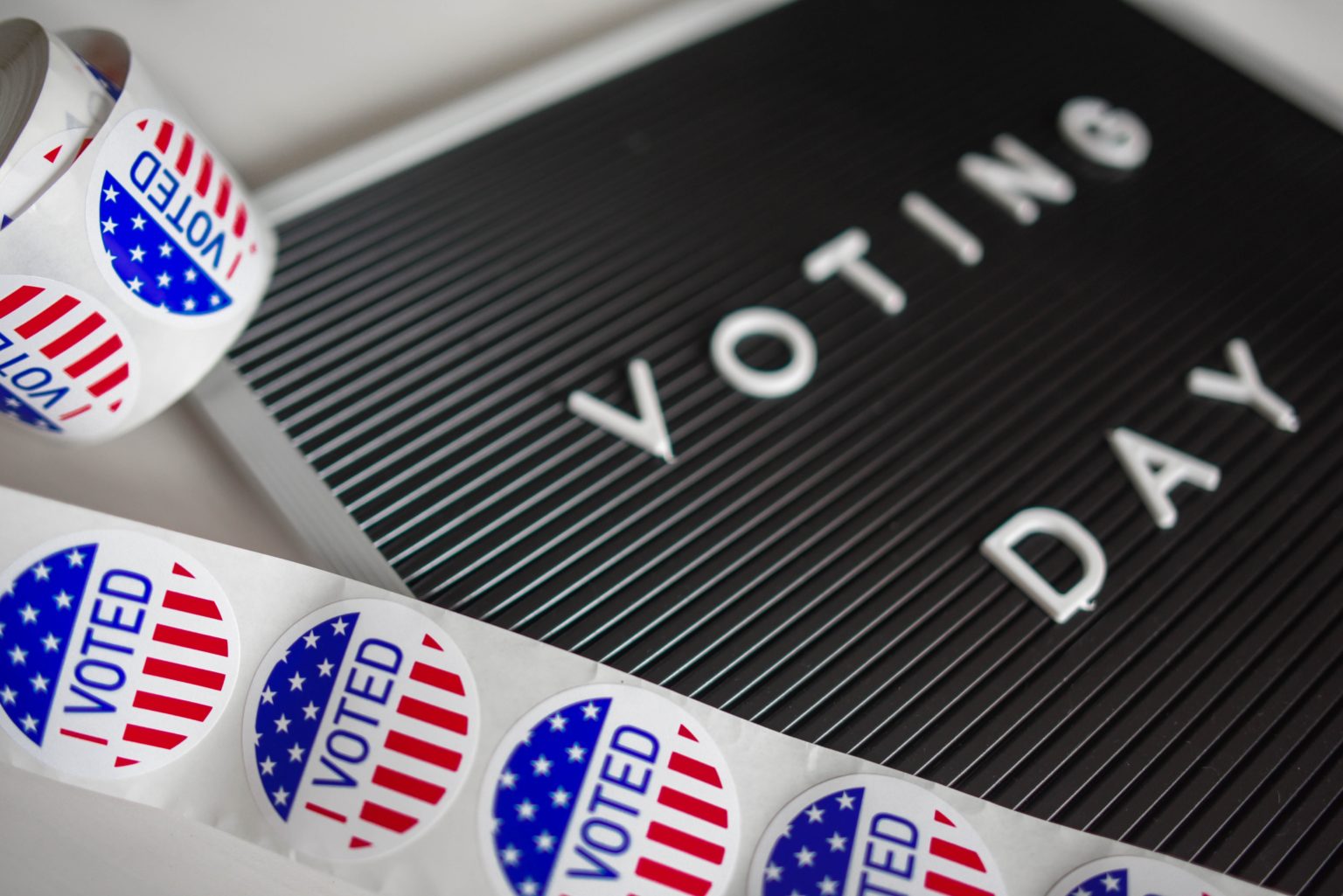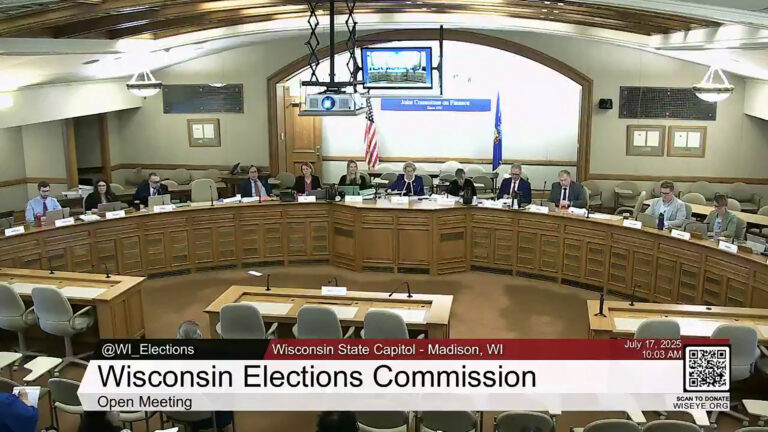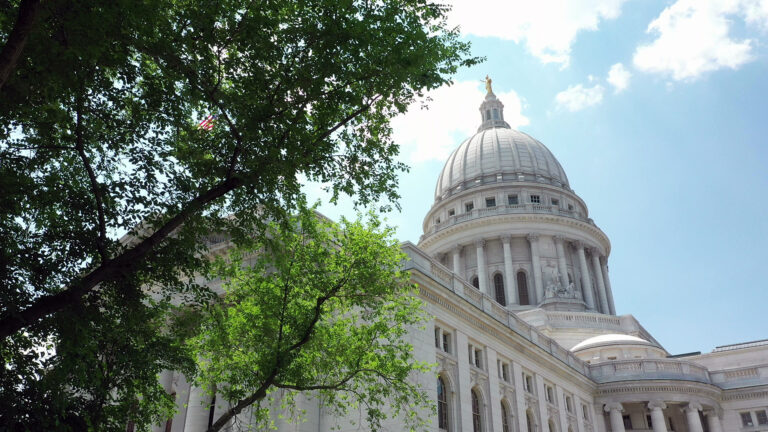Update: Polling Locations Consolidate Amid Poll Worker Shortage
During a meeting discussing preparations for the election now one week away, the Wisconsin Elections Commission discussed the shortage of poll workers, the record number of absentee ballots that have been requested, and the special health considerations necessary to conduct in-person voting while minimizing the spread of the novel coronavirus.
By Marisa Wojcik | Here & Now
March 31, 2020

[Voting stickers and sign via pexels.com]
The Wisconsin Elections Commission reported Tuesday that 60% of state municipalities will be short poll workers for the April 7 election, attributing the shortage to concerns from the COVID-19 pandemic.
During a meeting discussing preparations for the election now one week away, the commission discussed the shortage of poll workers, the record number of absentee ballots that have been requested, and the special health considerations necessary to conduct in-person voting while minimizing the spread of the novel coronavirus.
As many as 111 municipalities reported their need as critical and “cannot staff even one polling place” based on a survey of clerks conducted over the weekend. Clerks reported a shortage of nearly 7,000 poll workers.
Commission administrator Meagan Wolfe said the tallies are constantly changing. Clerks said the problem is growing and are concerned many workers won’t show on election day because they are sick or afraid of becoming sick.
The elections commission, the Department of Administration and the State Emergency Operations Center have been doing outreach to groups like state employees and volunteer organizations to recruit more workers. If necessary, Gov. Tony Evers will call upon the Wisconsin National Guard to assist where needed.
Commission staff have also been working to train a reserve pool of people that can be sent out to polling locations lacking enough staff on election day.
Even so, clerks face an uphill battle. Poll workers must be trained on general election inspector duties as well site-specific information for individual locations’ procedures and technology, as well as new protocols for COVID-19 considerations.
Additionally, election workers must reside in the same county as the polling location where they are working and chief election inspectors must be from the same municipality.
“It should be noted that many jurisdictions have dramatically consolidated polling places,” Wolfe wrote in a memo to commission members, but did not specify how many or which locations.

Map of Poll Worker Shortages
Counties and municipalities are consolidating polling locations to efficiently utilize what poll workers they currently have and because turnout for in-person voting is expected to be low. The commission has agreed to allow poll workers to use WisVote, an electronic statewide election management and voter registration system, in lieu of traditional paper poll books when checking in voters.
Clerks are being urged to update polling consolidation information within WisVote as soon as possible so that voters can find their updated polling location at myvote.wi.gov. The commission also discussed posting clear signage on all closed polling locations directing voters to the new site.
Record-breaking absentee ballot requests
Wolfe reported 900,000 absentee ballots had been requested so far, the most ever in state history. That number is also predicted to be underreported and closer to over one million as clerks try to keep up with updating numbers in the WisVote system.
Of the absentee ballots requested, 300,000 of them have been returned. Clerks have been instructed to examine and organize the ballots ahead of time but cannot begin opening or counting ballots until 7 a.m. on April 7 when the polls open. All absentee ballots must be turned in by 8 p.m. on election day by mail-in or hand delivery in order to be counted.
Commissioners discussed what could be done in the event that a considerable number of absentee ballots are returned through the mail in time since voters can request an absentee ballot up until April 2.
Municipalities will be allowed to establish drop boxes for absentee ballots, as long as they are secure, monitored and regularly emptied throughout election day.
A motion was put forth urging the judge in a federal lawsuit challenging the April 7 election to consider the unprecedented number of absentee ballots requested and to allow additional time for ballots to be received and processed. The motion, which ultimately failed, would have also asked the judge to consider ballots postmarked on or before election day to be counted.
Under current state statute, the only time a ballot can be counted after election day is when a voter fails to bring a proper photo ID and must cast a provisional ballot.
Election inspectors were advised to prepare for the event that processing absentee ballots could occur late into the night and into the next day. The commission and the public should be notified and their unofficial numbers cannot be updated until processing is complete.
Supplies distributed
The unprecedented request for absentee ballots has left a severe shortage of envelopes in which to mail them. In March, 1.2 million absentee envelopes were distributed to counties and the commission has ordered a million more. While the most critically needed envelopes are expected to arrive by April 1, the remainder probably won’t show up until after election day.
The Department of Health Services recently came out with guidance for preventing the spread of the virus on election day, including disinfecting surfaces.
Cleaning supplies will be distributed to help maintain a sanitary environment at the polls. Stockpiles of 10,000 spray bottles, 6,000 liters of multi-purpose sanitizer, 7,000 paper towel rolls and 750,000 isopropyl wipes will be divvied up and delivered to seven regional locations where counties can pick up their supplies.
Additionally, 1.5 million pens will be delivered so that each voter can use one pen when signing a poll book and casting a ballot.
The Wisconsin National Guard will assist the commission in delivering and distributing supplies to locations around the state.
Wolfe noted that personal protective equipment such as gloves and masks will not be provided to poll workers, as these are in short supply and must be reserved for medical personnel.
Commissioners split on election day preparedness
Members of the elections commission were split on how well the state was equipped to hold the election on April 7.
After discussing logistics for election day preparation, Commissioner Robert Spindell stated he thought they “could have a good election on the seventh.”
But Commissioner Mark Thomsen disagreed saying, “There’s an avalanche coming at the clerks.” He added, “To sit here as a Commission and say everything’s going to be fine on April 7th is sticking our head in the sand.”
Thomsen put forth a motion to advise a federal judge that the best alternative date for the election would be May 12, but the motion failed as the majority of commissioners agreed that at this point the election must happen April 7.
“I don’t think it’s a good idea to move the date,” Commissioner Marge Bostelmann told members. “We don’t know what’s going to happen on May 12 as far as whether it’s going to be any safer or not.”
“I’m not in favor of this motion,” Commissioner Julie Glancey told members, “but I am very concerned that this election is going to go down as probably one of the worst elections in Wisconsin’s history.”
 Passport
Passport











Follow Us